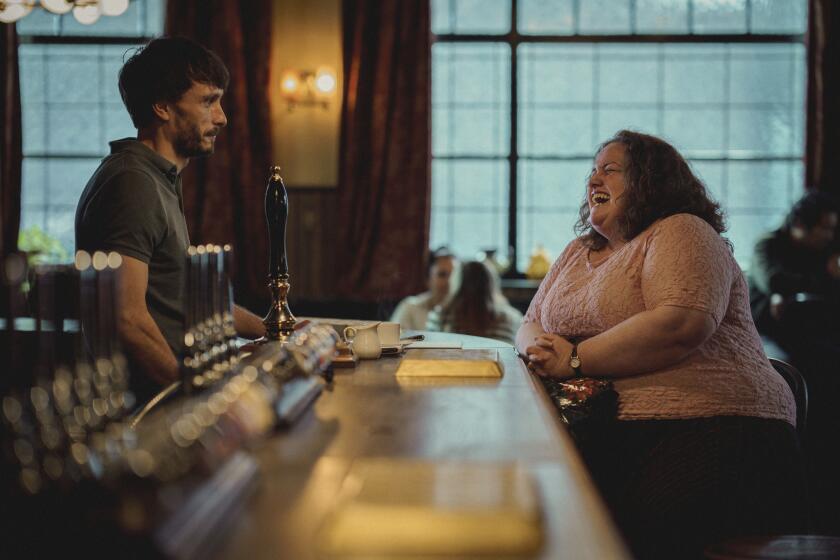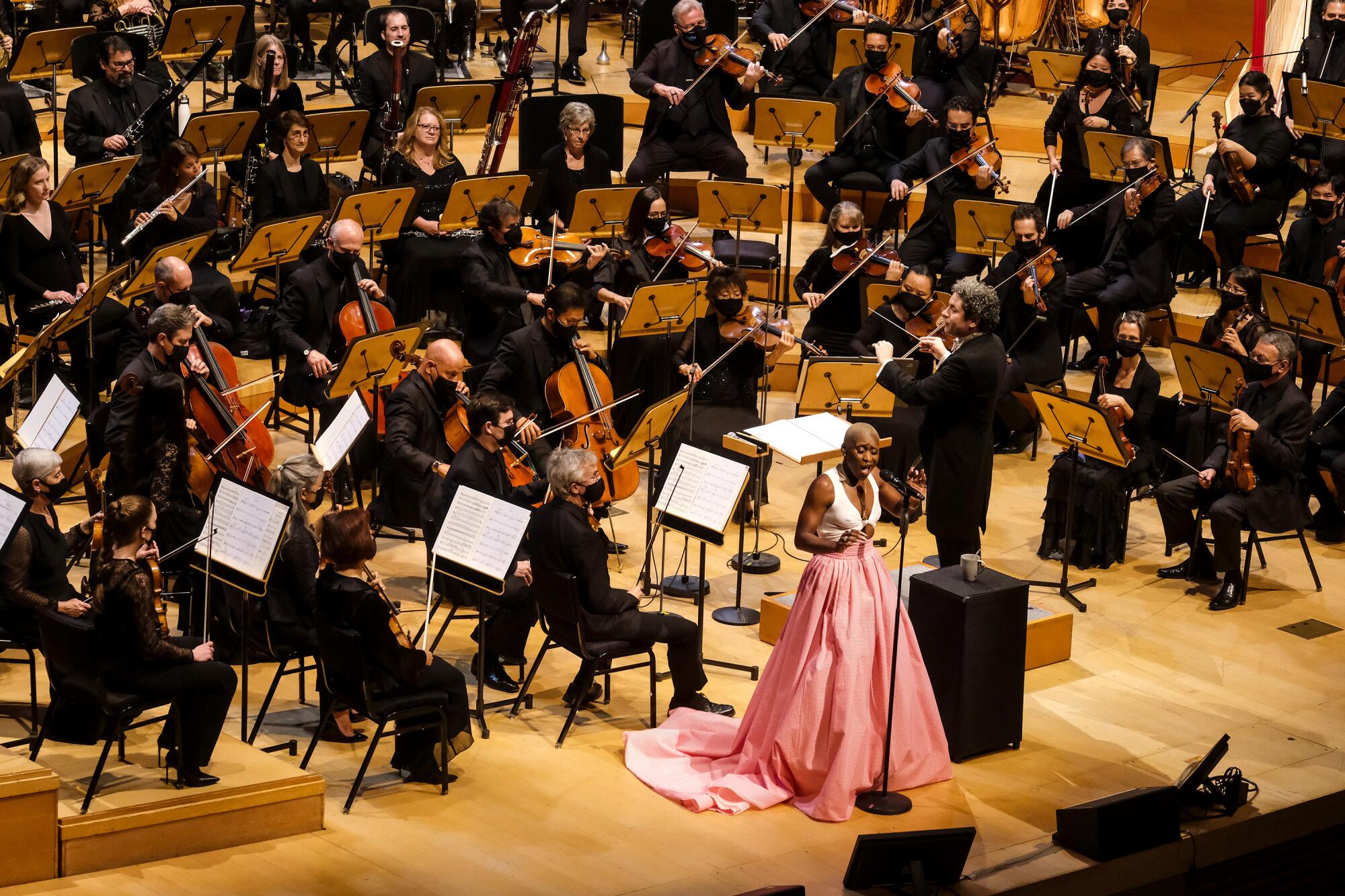
Homecoming can easily turn fraught. Just ask Ulysses.
The Los Angeles Philharmonic untypically appeared to be taking no chances Saturday night with “Homecoming,” its first season-opening gala in two years. On paper it looked as though an irrepressible orchestra that likes nothing more than to challenge expectations with its glitzy, provocative, artistically ambitious and occasionally goofy galas had become cautiously moxie-free.
This time, there were only single movements from two classical music chestnuts. A pop star made an appearance with three songs, one of them being Leonard Bernstein’s evergreen “Somewhere.” An upbeat short new piece commissioned by a familiar composer opened the program. There weren’t even any encores, and no silver or gold confetti sensationally descended from the ceiling at the end.
That’s right, no glittery confetti celebrating the momentous occasion of the L.A. Phil’s first concert back in Walt Disney Concert Hall since March 8, 2020. “We counted the 470-something days, hours, seconds, and here we are,” Gustavo Dudamel exultantly told the audience. The orchestra’s music and artistic director counted on something else as well: that music is all that matters.
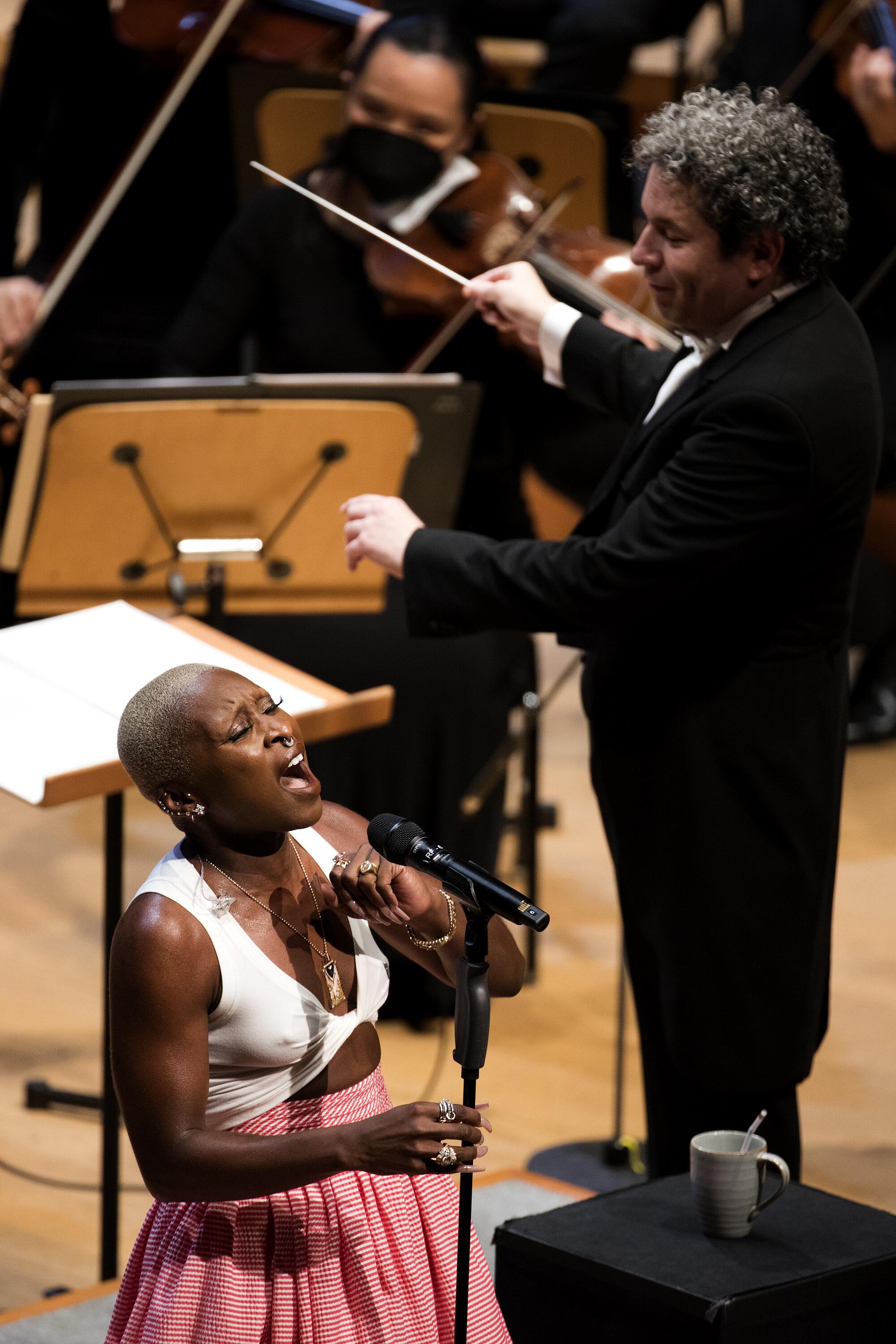
Improbably and incomparably, it was a great gala.
In retrospect, one could find signs that something was up with Dudamel and the orchestra when a few performances at the Hollywood Bowl this summer reached a revelatory level. Still, that hardly forecast a gala in which every seeming cliché consequentially clicked.
The atmosphere was, of course, energized by loyal audience excitedly back in its beloved concert hall. Dudamel was greeted like a pop star himself. The mood was sheer love-fest. Standing ovations added aerobics to the concert menu. At one point Dudamel turned to the orchestra and said, “I love you with all my heart.” Eyes, this night, teared up more than once. It was maybe the most moving evening in the hall since Esa-Pekka Salonen’s farewell concert as music director in 2009.
Mystically distant trumpets in Gabriela Ortiz’s magical “Kauyumari,” the first music heard, compellingly set the stage. One of Mexico’s most important composers and a favorite of Dudamel‘s, Ortiz took her inspiration from the image of a blue deer (or Kauyumari) that is the guide for Mexico’s Huichol people when, after taking peyote, they seek to heal their souls. Through a Huichol melody brought to vivid rhythmic life, Ortiz offered her own aural hallucinogenic.
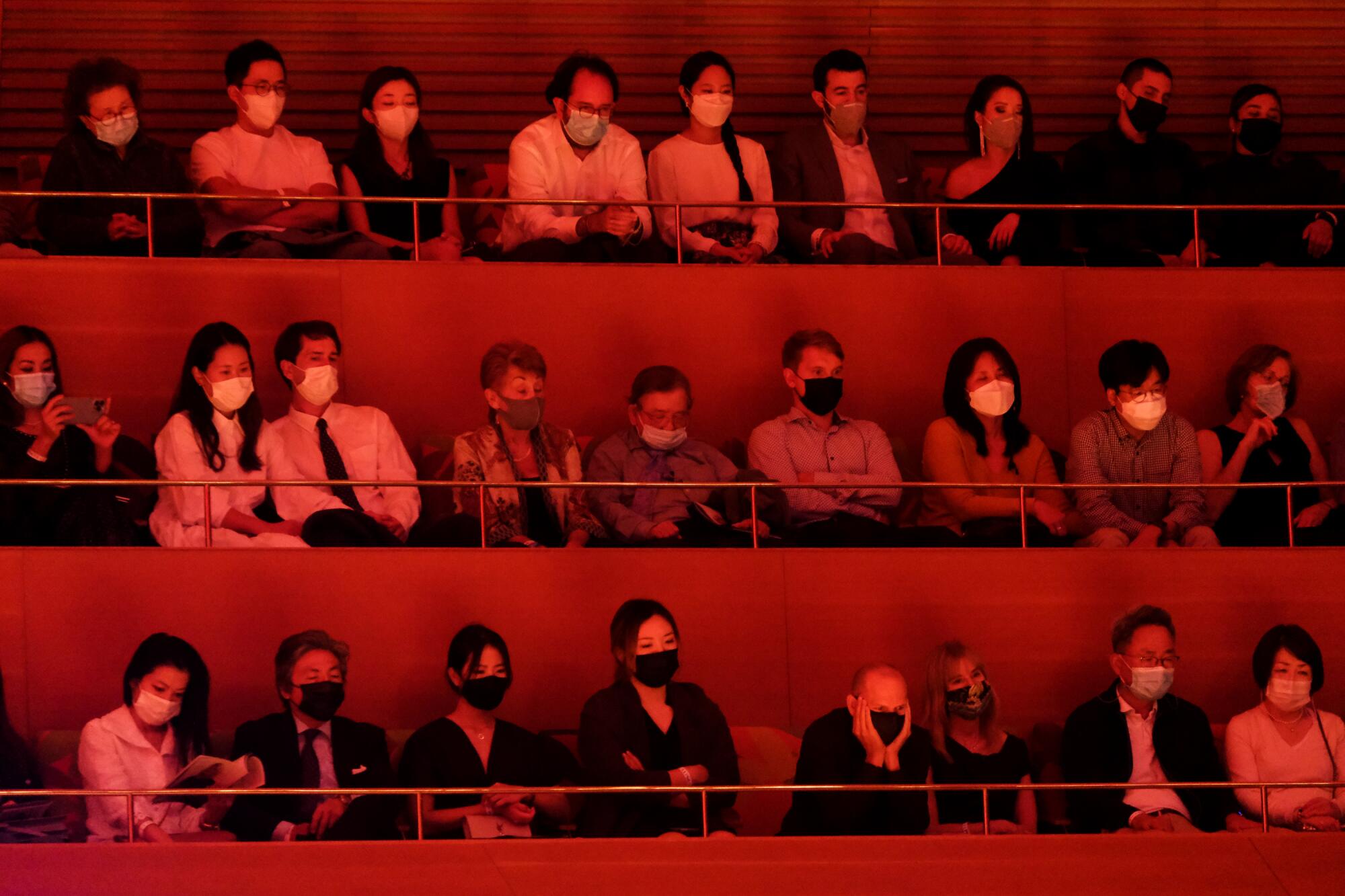
With her kaleidoscopic eyes (and ears), this Gaby in the sky with diamonds turned the jaunty tune into a ravishing vision, its repetitious rhythms keeping a listener glued while the changing instrumental colors created the unnerving effect of feeling unglued. The Huichol melody was always there, but you never could predict where or how it would turn up in the orchestra. We thought we knew what was happening, but Ortiz kept reminding us that we didn’t, which felt exactly of our own moment. I suspect (and hope) “Kauyumari” will join the orchestral hit parade.
You can’t get much more commonplace in classical than the opening of Tchaikovsky’s First Piano Concerto. Yet Dudamel, with the help of the young Korean pianist Seong-Jin Cho, somehow made it fresh. The L.A. Phil musicians can doubtlessly play it in their sleep, but the almost-forgotten reality of this orchestra in this hall (sorry, Apple, but your new spatial music does not come remotely close) became its own kind of Tchaikovskian peyote.
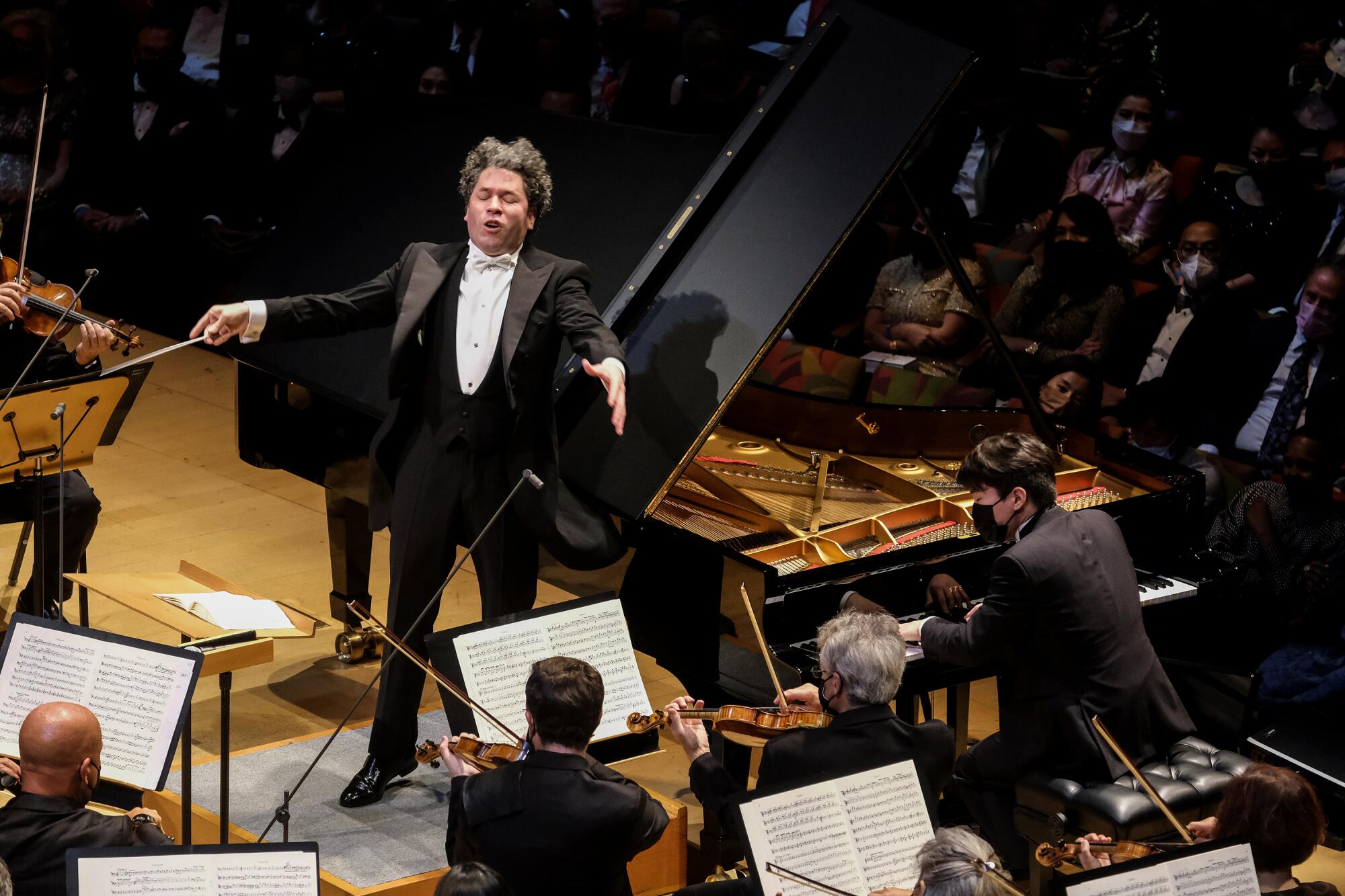
Coronavirus may have silenced our symphony halls, taking away the essential communal experience of the concert as we know it, but The Times invites you to join us on a different kind of shared journey: a new series on listening.
The horns heralded yet another vision. Cho, who comes across on his recordings as a mild-mannered performer whose crystal-cut phrasing tells you almost nothing of himself, sprung to life with magnificent sparkle, the sounds of bells ringing, approaching that of Horowitz. Cho made a perfect foil for Dudamel’s extravagant expressivity. The orchestra stopped just short of overwhelming Cho, framing his playing, instead, in rich glory. You will not find its like captured on Cho’s discs or downloads.
The same might be true for Cynthia Erivo, who came next. Her performance of “Somewhere” from Bernstein’s “West Side Story” at the Kennedy Center can be found on the National Symphony’s website. It is beautiful. With Dudamel and the L.A. Phil, Erivo dropped the beautiful after about 30 seconds and dug deep, then brilliantly deeper.
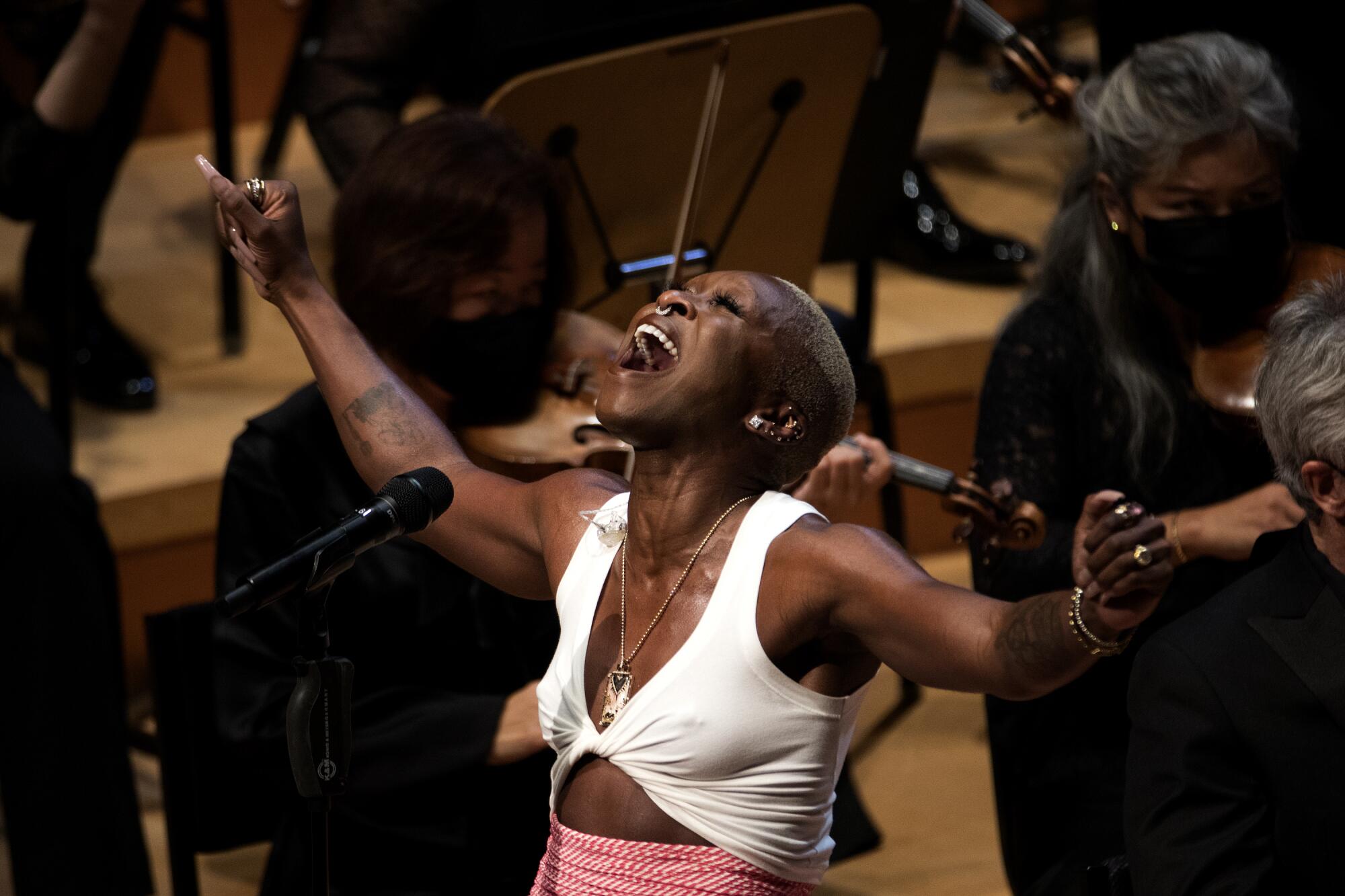
The somewhere she sought — with powerful, low earthly tones and strikingly unearthly high ones, her timbre changing to meet the expressive needs of each word while her intonation remained remarkably true — was not out of reach, not outside of us all, but within. It was a spectacular performance. No one has any right to speak for Bernstein, but he was in the room, somewhere.
After two more Erivo songs, “Feeling Good” and “Don’t Rain on My Parade” — impressive without raining on the “Somewhere” parade — Mahler entered the room. A dozen years ago, Dudamel conducted his first L.A. Phil gala as music director. He was 28, as was Mahler when he wrote his First Symphony, which was on the program.
This became a famous concert, broadcast around the world, and it is available on commercial video. The extreme propulsion the young Dudamel brought to the final movement’s arresting 20-minute progress from panicky crisis to euphoric exultation felt like prophesy. Then the confetti rained.
That movement ended Saturday’s gala, and ended it in way that nothing could follow. Prophesy fulfilled came around two minutes faster, with less propulsion and more exploration of Mahlerian detail, of getting inside of everything. The symphony became more blossoming than a progression. The ending here turned into a monumental what-didn’t-kill-us-made-us-stronger statement, more sober than a sheer adrenaline release of energy. It was a loud and solid and all-consuming climax that wasn’t really a climax but a reason for being.
The L.A. Phil is, without question, back — and back as the orchestra of the future that understands the necessity of looking back. The gala wasn’t a normal gala. The orchestra has a no-nonsense vaccination policy with no exceptions. Masks, obviously.
The titles of the three pieces Dudamel conducts for his first regular season program, beginning Thursday, pretty much say it all: “Transfigured Night,” “Four Last Songs,” “Death and Transfiguration.” Confetti and encores can wait.
More to Read
The biggest entertainment stories
Get our big stories about Hollywood, film, television, music, arts, culture and more right in your inbox as soon as they publish.
You may occasionally receive promotional content from the Los Angeles Times.












